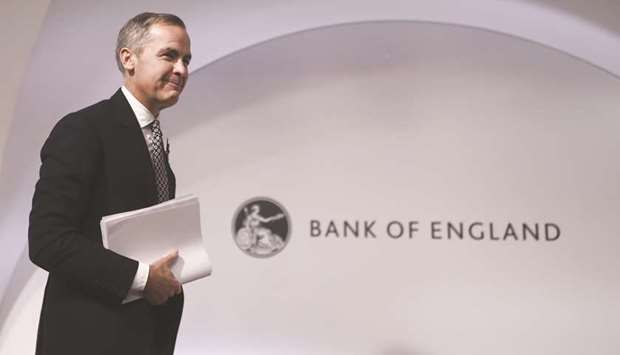The Bank of England is debating the merits of additional monetary stimulus and has plenty of room to act to prop up the economy, according to Governor Mark Carney. The pound fell.
While the economy appears to be strengthening, he said there may be a need to do more to secure the recovery. His dovish tone comes as two members of the Monetary Policy Committee are already pushing for interest-rate reductions. The comments surprised traders, and the pound weakened as much as 0.6% and traded at $1.3096 as of 10:36am in London.
“The economy has been sluggish, slack has been growing, and inflation is below target,” Carney said. “Much hinges on the speed with which domestic confidence returns. As is entirely appropriate, there is a debate at the MPC over the relative merits of near term stimulus to reinforce the expected recovery in UK growth and inflation.”
The BoE held fire in the global wave of monetary easing last year, even as uncertainty around Britain’s departure from the European Union and trade tension between the US and China hurt demand. If those issues are resolved smoothly, the bank maintains that a series of gradual and limited rate hikes over several years will be needed to keep inflation in check. The next move may well fall to Carney’s appointed successor, Andrew Bailey.
The UK central bank has sufficient headroom to “at least double” its August 2016 package of £60bn ($78bn) of asset purchases, which would deliver the equivalent of around a 100 basis-point cut to the benchmark, which currently stands at 0.75%.
The use of forward guidance, or explaining how the bank might respond to changes in the future, also “adds to this armoury.” Carney didn’t mention using negative interest rates as a tool.
“All told, a reasonable judgement is that the combined conventional and unconventional policy space is in the neighbourhood of the 250 basis points cut to bank rate seen in pre-crisis easing cycles,” he said in a speech at the BoE’s Future of Inflation Targeting Conference in London yesterday.
“Carney’s comments show the stimulus debate on the MPC is more finely balanced than the recent vote splits suggest. Ultimately we still think the committee will hold off cutting rates but it’s clear the tolerance for downside surprises is low,” said Dan Hanson of Bloomberg Economics.
Still, policy makers’ latest official projections show a reversal of the negative trends, Carney said, with output likely to be supported by a reduction in Brexit uncertainty, an uptick in fiscal stimulus and a recovery in global growth. There are some tentative signs of those predictions coming to fruition, he pointed out in the speech.
The MPC will provide a new assessment of the economy on January 30, when they will publish their policy decision, updated forecasts on growth and inflation, and a stock-take of the supply side of the economy.
Carney, who steps down as governor in March, also said that the three-century old central bank could benefit from a change in its remit to recognise the use of flexibility in its current inflation targeting framework. Even so, he said that while he supports a regular review, there would have to be strong justification for larger changes.
“The bar for changing the regime is high,” he said. “But it is nonetheless healthy to review it periodically, and that review is supported by the bank’s active research agenda.”
He highlighted one option that he said would only be a “modest change.” He sees a possible upside to amending the remit so that the central bank could let rates sit “lower for longer” to provide additional stimulus at the lower bound. That could mean inflation then runs above-target for a period, but Carney said this trade-off can be accommodated.
“There could be benefits to changing the remit to recognise explicitly that this is an acceptable use of flexibility,” he said.

Mark Carney, governor of the Bank of England, departs following the bank’s Monetary Policy Report news conference in the City of London (file). While the economy appears to be strengthening, Carney says there may be a need to do more to secure the recovery. His dovish tone comes as two members of the Monetary Policy Committee are already pushing for interest-rate reductions.
